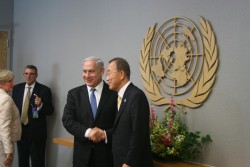
Can the Mideast Quartet get the Palestinians to shake Israel’s hand? Prime Minister Netanyahu (Left) and UN Sec-Gen Ban. Illustrative. By Joshua Spurlock
The European Union is pushing a plan for peace between Israel and the Palestinians, in the midst of an upsurge in terrorism and no serious peace talks in years. The solution being promoted? A report with ideas to restart the peace process.
That ambitious goal was promoted by Federica Mogherini, the foreign affairs chief for the European Union, on her blog. The top EU diplomat said the Quartet—which also includes the US, Russia, and the United Nations—agreed to “immediately” start coordinating the report and its peace process “recommendations,” which she said would be done in cooperation with multiple Middle East nations based on peace proposal from the Arab states. While Mogherini, in a post on the EU External Action website, has left negotiating borders up to negotiations, the Arabs have held very settled views on what Israel’s land compromises should be. And just two days after the Quartet hatched the latest peace proposal, Palestinian fifteen-year-olds opened fire on Israeli soldiers.
Israeli Prime Minister spokesman Ofir Gendelman posted a photo on Twitter of the rifle used in the Palestinian teenage attack and said that one of the teens made his plans very clear. “1 of the 15 y/o Palestinian terrorists who fired today on IDF troops wrote on his FB [Facebook] that he wants to die while perpetrating a terror attack,” tweeted Gendelman. Incidents such as this make a renewed peace process seem farther away than ever.
That doesn’t seem to be deterring Mogherini, who blogged that she spoke with Israeli leader Benjamin Netanyahu and Palestinian President Mahmoud Abbas and both men were open to take part of the latest effort to revive the peace process.
Meanwhile, during Mogherini’s talk with Netanyahu that was recapped on the EU website, she noted that despite the EU proposal to label Israeli products as coming from territory claimed by the Palestinians, she nonetheless said that that approach “is without prejudice to any final status issues, including borders, which should be settled in direct negotiations between the parties.”
Netanyahu underscored that position in his comments, released by his office, to the Israeli cabinet on Sunday. “I heard from her that the EU is opposed to any boycott of Israel, and about their action regarding product labeling, she…. said that it does not reflect their position regarding the final borders of the State of Israel, which can be determined—this is what she said—only in direct negotiations between the sides.”
The labeling guidance is officially a nation-by-nation decision for the EU, according to Mogherini.
Netanyahu overall felt good about the conversation with Mogherini. “Israel, as a representative of democratic values, is entitled to receive support from Europe and not just criticism, and I think that this step is welcome.”
He noted there would be disagreements with the EU and individual nations in Europe, “just as there are countries, more than a few, that also support our position,” said Netanyahu. “But the fact that the EU High Representative for Foreign Affairs and Security Policy has come out strongly against economic sanctions against Israel, is—of course—a step in the right direction.”
(By Joshua Spurlock, www.themideastupdate.com, February 14, 2016)
